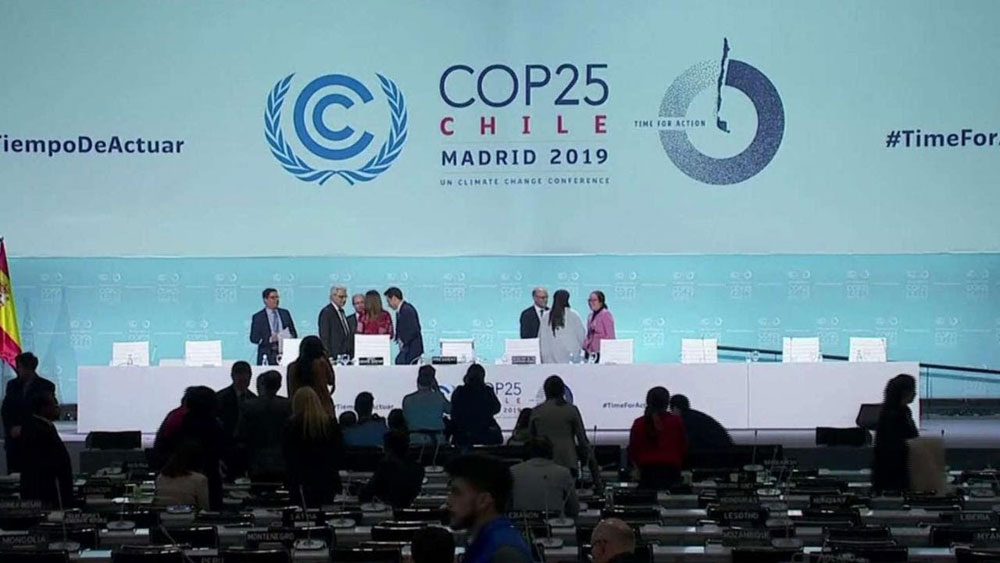
December 15, 2019; Washington Post
The news coming from the United Nations’ climate conference in Madrid could hardly be more discouraging. As Brady Dennis and Chico Harlan report in the Washington Post, global talks ended “with finger-pointing, accusations of failure, and fresh doubts about the world’s collective resolve to slow the warming of the planet—at a moment when scientists say time is running out for people to avert steadily worsening climate disasters.”
“The painstaking pace of the UN Framework Convention on Climate Change, or COP25,” write Dennis and Harlan, “stood in contrast to the mass demonstrations and vehement pleas from young activists.” Alden Meyer, director of strategy and policy for the Union of Concerned Scientists, says, “This is the biggest disconnect between this process and what’s going on in the real world that I’ve seen.”
“The world already has warmed more than one degree Celsius above preindustrial levels, and current pledges would put the planet on a trajectory to warm more than three degrees Celsius by the end of the century,” Dennis and Harlan note. They add, according to the United Nations, “global greenhouse gas emissions must begin falling by 7.6 percent each year beginning in 2020 to meet the most ambitious aims of the Paris climate accord. Global emissions are projected to hit a record high in 2019.”
A somewhat more promising note came from Brussels, where European leaders pledged to eliminate their carbon footprint by 2050. All told, about 80 countries have committed to setting more ambitious targets in 2020, but, Dennis and Harlan point out, “most are small and developing nations that account for barely 10 percent of the world’s emissions.”
Another hopeful sign is that even as the US federal government threatens to pull out of the Paris climate accords, “more than 3,800 leaders from America’s city halls, state houses, boardrooms and college campuses, representing more than 155 million Americans and $9 trillion of the US economy have signed the We Are Still In declaration.”
The need for action is evident, but the likelihood of global consensus has always relied on a bit of wishful thinking. Back in 2010, Elinor Ostrom, who won the Nobel Prize in Economics in 2009, warned us, “Waiting for effective policies to be established at the global level is unreasonable. Rather than only a global effort, it would be better to self-consciously adopt a polycentric approach to the problem of climate change in order to gain the benefits at multiple scales as well as to encourage experimentation and learning from diverse policies adopted at multiple scales.”
Sign up for our free newsletters
Subscribe to NPQ's newsletters to have our top stories delivered directly to your inbox.
By signing up, you agree to our privacy policy and terms of use, and to receive messages from NPQ and our partners.
This is not a rationale for complacency. Quite the contrary; if the 2015 Paris agreements are insufficient—and recall that if everyone, including the US, met its pledge, the world would still be on the path for a three-degree Celsius global temperature increase by 2100—then it will require actions beyond those taken by nation-states to meet the demands of the climate emergency.
What might this entail? The scale of the crisis is daunting, but local efforts matter. Earlier this month, in NPQ, we wrote about many potential strategies, including building ecosystems that support regenerative agriculture that can remove carbon from the atmosphere and restore the soil, and using biomimicry (that is, technology that works to boost natural processes). As one recent report points out, biomimicry is “being used in cities to emulate the complex engineering and design principles found in the natural world in ways that can tackle climate breakdown, water stresses, air quality, and biodiversity loss. Practical applications are readily applicable and need to be central to urban development through hybrid natural-city features through living walls, rooftop farms, vertical gardens, water-centric design, and breathing buildings.”
Last month, a group of over 11,000 scientists from 153 countries observed, “Despite 40 years of global climate negotiations, with few exceptions, we have generally conducted business as usual.”
The climate crisis has arrived and is accelerating faster than most scientists expected…especially worrisome are potential irreversible climate tipping points and nature’s reinforcing feedbacks (atmospheric, marine, and terrestrial) that could lead to a catastrophic “hothouse Earth,” well beyond the control of humans.
The scientists called for six actions—a shift to renewables, lower methane emissions, protecting natural carbon sinks, reducing meat consumption, an economy based on equity and sustainability, and stabilizing global population.
They added that the biggest hope for progress came from a rising civil society. “Schoolchildren are striking,” the scientists wrote. “Ecocide lawsuits are proceeding in the courts. Grassroots citizen movements are demanding change, and many countries, states and provinces, cities, and businesses are responding.”—Steve Dubb













